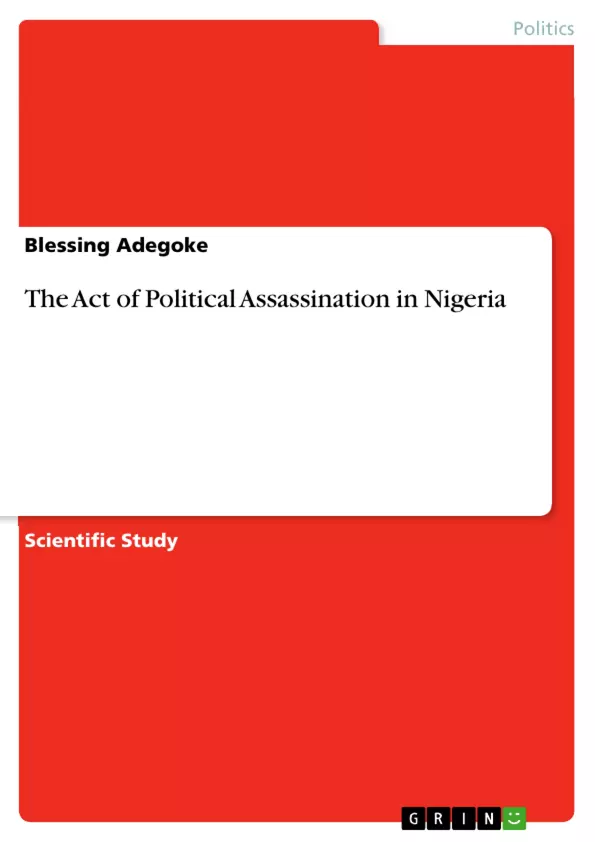Political assassination is murder (a usually prominent person) by a sudden and/or secret attack, often for political reasons. It is usually planned murder of a person who occupied or wants to occupy a position of public reckoning. Additionally, Political assassination is the act of deliberately killing someone especially a public figure, usually for hire or for political reasons.
As an individual unfold in Nigeria, one seems to be unsure of political given the unsevoury constancy of political inclined thuggery, violence, conflicts and assassination. This calls for concern given the fact that the fourth and fifth republic is another opportunity for democratic practice that has been eluding since independences. It is therefore not a figment grovel imagination that the frequency in politically motivated killing in Nigeria seems to be associated with the weakness inherent in the post-colonial states in Africa.
This has manifested itself in the better struggle for political power and intolerances and which has eventually frustrating the people’s hope of enjoying politics devoid of rancor and killings.
Table of Contents
- Chapter One: Introduction
- 1.1 Background to the Study
- 1.2 Statement of the Problem
- 1.3 Objectives of the Study
- 1.4 Research Questions
- 1.5 Research Hypotheses
- 1.6 Significance of the Study
- 1.7 Research Methodology
- 1.8 Scope of the Study
- 1.9 Limitations of the Study
- 1.10 Organization of the Study
- Chapter Two: Literature Review
- Chapter Three: Research Methodology
- Chapter Four: Data Presentation and Analysis
Objectives and Key Themes
This study aims to examine the impact of political assassinations on political participation in Nigeria, specifically during the Fourth and Fifth Republics. It seeks to understand the extent to which these events have affected citizen involvement in politics and their implications for democratic governance. The research utilizes both primary and secondary data sources to analyze the issue and provide recommendations for curbing political assassinations.
- The effect of political assassination on political participation in Nigeria.
- The extent of political assassination's impact on Nigerian citizen political involvement.
- The implications of political assassinations for democratic governance in Nigeria.
- Methods for curbing political assassinations in Nigeria.
- Analysis of the concept of political assassination within the Nigerian context.
Chapter Summaries
Chapter One: Introduction: This chapter sets the stage for the study by defining political assassination, highlighting its prevalence in Nigeria's political landscape, and emphasizing the need for research into its effects on political participation. It outlines the problem, stating that while political assassinations have been a persistent issue since independence, their frequency and impact during the Fourth and Fifth Republics demand attention. The chapter details the study's objectives, research questions, hypotheses, significance, methodology, scope, and limitations. It emphasizes the gap in existing research regarding the effect of political assassinations on citizen participation, focusing particularly on the period between 1999 and 2011. The chapter also provides a brief overview of the study's organization, chapter by chapter.
Chapter Two: Literature Review: [This section requires the content of Chapter Two to create a summary. Please provide the text of Chapter Two for a complete preview.]
Chapter Three: Research Methodology: [This section requires the content of Chapter Three to create a summary. Please provide the text of Chapter Three for a complete preview.]
Chapter Four: Data Presentation and Analysis: [This section requires the content of Chapter Four to create a summary. Please provide the text of Chapter Four for a complete preview.]
Keywords
Political assassination, political participation, Nigeria, democratic governance, Fourth Republic, Fifth Republic, citizen involvement, political violence, research methodology, quantitative analysis, qualitative analysis.
Frequently Asked Questions: A Comprehensive Language Preview
What is the focus of this study?
This study examines the impact of political assassinations on political participation in Nigeria, specifically during the Fourth and Fifth Republics (1999-2011). It investigates how these events affected citizen involvement in politics and their implications for democratic governance.
What are the key objectives of the research?
The study aims to understand:
- The effect of political assassination on political participation in Nigeria.
- The extent of political assassination's impact on Nigerian citizen political involvement.
- The implications of political assassinations for democratic governance in Nigeria.
- Methods for curbing political assassinations in Nigeria.
- Analysis of the concept of political assassination within the Nigerian context.
What is the structure of the study?
The study is organized into four chapters:
- Chapter One: Introduction: Provides background, problem statement, objectives, research questions, hypotheses, significance, methodology, scope, limitations, and organization of the study.
- Chapter Two: Literature Review: [Content not provided in the preview.]
- Chapter Three: Research Methodology: [Content not provided in the preview.]
- Chapter Four: Data Presentation and Analysis: [Content not provided in the preview.]
What data sources are used in the research?
The research utilizes both primary and secondary data sources to analyze the impact of political assassinations.
What are the key themes explored in this study?
Key themes include the relationship between political assassination, political participation, democratic governance in Nigeria, and the development of effective strategies to curb political violence.
What are the keywords associated with this research?
Political assassination, political participation, Nigeria, democratic governance, Fourth Republic, Fifth Republic, citizen involvement, political violence, research methodology, quantitative analysis, qualitative analysis.
What is the significance of this study?
The study addresses a gap in existing research by focusing on the effect of political assassinations on citizen participation, particularly during the Fourth and Fifth Republics in Nigeria (1999-2011). The findings are intended to contribute to a better understanding of the issue and to inform strategies for curbing political assassinations and promoting democratic governance.
What are the limitations of the study?
[This information is not explicitly detailed in the provided preview. The limitations would be described within Chapter One.]
- Citation du texte
- Blessing Adegoke (Auteur), 2010, The Act of Political Assassination in Nigeria, Munich, GRIN Verlag, https://www.grin.com/document/178870



